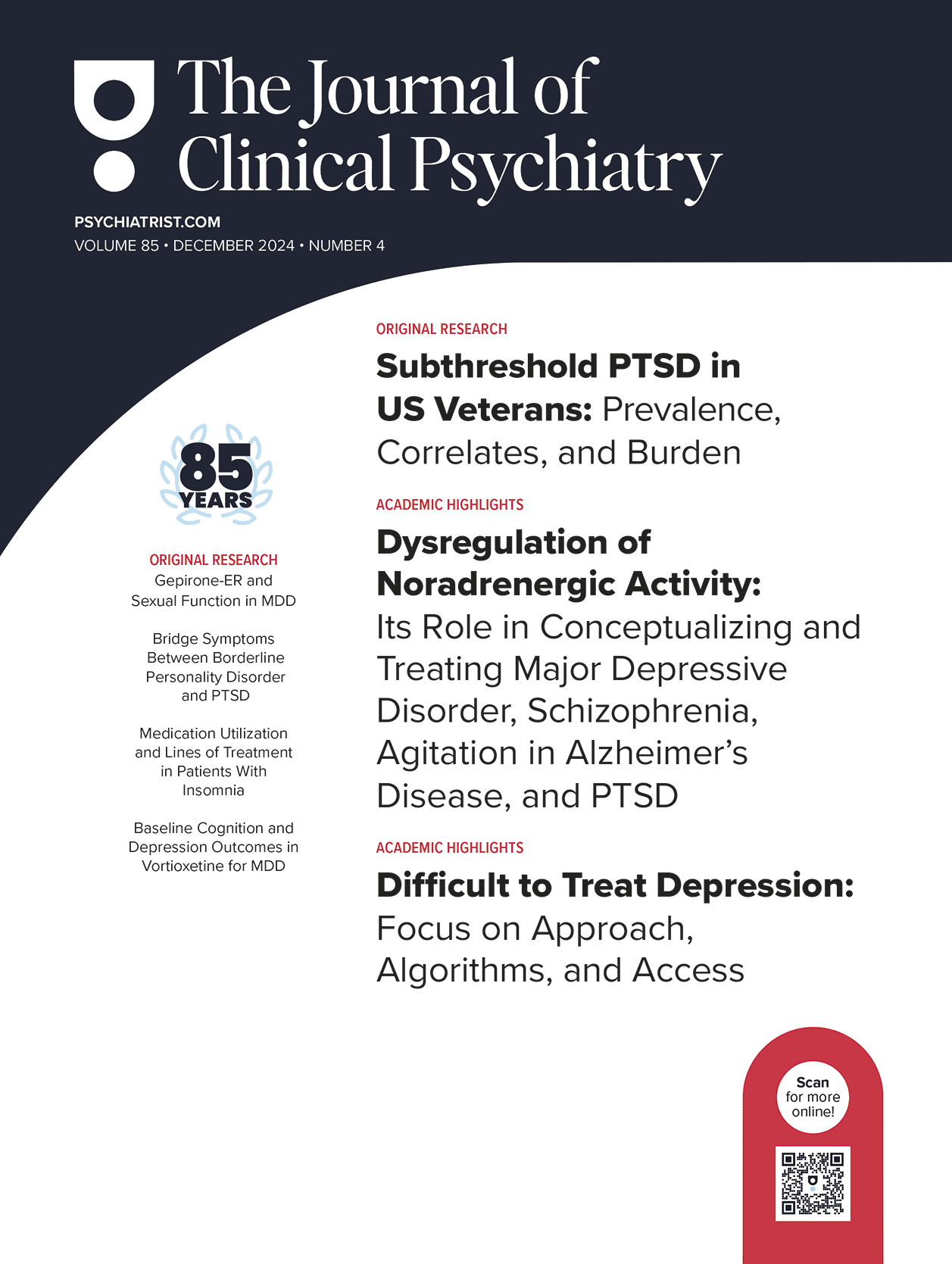Abstract
Objectives: The purpose of this research was to assess the timing and characteristics of the onset of perinatally occurring obsessive-compulsive disorder (OCD). OCD is a potentially disabling anxiety-related mental health condition for which the perinatal period represents a time of increased risk for onset, recurrence, and exacerbation.
Methods: This was a prospective cohort study conducted in British Columbia, Canada. Recruitment took place from January 23, 2014, to September 9, 2016. Participants provided information on reproductive and demographic questionnaires and diagnostic interviews (using the Structured Clinical Interview for DSM-5) in late pregnancy and at 2 postpartum time points. Only participants who reported symptoms meeting full criteria for OCD during their current perinatal period were included in this report of findings (N = 97). Analyses were primarily descriptive in nature, with χ2 tests employed to test differences in onset (pregnancy vs postpartum) and perinatal OCD development based on age first symptom onset (childhood/ adolescence vs adulthood).
Results: Over two-thirds (71%) of participants whose symptoms met full criteria for OCD at some point in their most recent perinatal period reported perinatal disorder onset. The majority of these (74%) reported onset during their first perinatal period. Perinatal disorder onset was much more likely to occur in the postpartum (83%), compared with in pregnancy (17%), χ2 (1, N = 69) = 29.3, P < .001. Symptom exacerbations were more likely to occur in the postpartum (77%) compared with prenatally (35%). Further, the lag time from symptom onset to disorder onset was shorter among participants who experienced a perinatal compared with a nonperinatal onset of their OCD.
Conclusion: Findings contribute to our understanding of perinatal OCD onset, emphasize the vulnerability to OCD during the perinatal period, and provide one of the first assessments in which symptom onset is distinguished from disorder onset. This work underscores the importance of recognizing the distinct nature of perinatal OCD.
J Clin Psychiatry 2024;85(3):24m15266
Author affiliations are listed at the end of this article.
Continue Reading...
Did you know members enjoy unlimited free PDF downloads as part of their subscription? Subscribe today for instant access to this article and our entire library in your preferred format. Alternatively, you can purchase the PDF of this article individually.
References (29)

- American Psychiatric Association. Diagnostic and Statistical Manual of Mental Disorders: DSM-5. 5th ed. American Psychiatric Publishing, Inc; 2013.
- Coluccia A, Fagiolini A, Ferretti F, et al. Adult obsessive-compulsive disorder and quality of life outcomes: a systematic review and meta-analysis. Asian J Psychiatr. 2016;22:41–52. PubMed CrossRef
- Stasik SM, Naragon-Gainey K, Chmielewski M, et al. Core OCD symptoms: exploration of specificity and relations with psychopathology. J Anxiety Disord. 2012;26:859–870. PubMed CrossRef
- Ruscio AM, Stein DJ, Chiu WT, et al. The epidemiology of obsessive-compulsive disorder in the National Comorbidity Survey Replication. Mol Psychiatry. 2010;15:53–63. PubMed CrossRef
- Fawcett EJ, Fairbrother N, Cox ML, et al. The prevalence of anxiety disorders during pregnancy and the postpartum period: a multivariate bayesian meta analysis. J Clin Psychiatry. 2019;80:18r12527. PubMed CrossRef
- Fairbrother N, Collardeau F, Albert AYK, et al. High prevalence and incidence of obsessive-compulsive disorder among women across pregnancy and the postpartum. J Clin Psychiatry. 2021;82:20m13398. PubMed CrossRef
- Starcevic V, Eslick GD, Viswasam K, et al. Symptoms of obsessive-compulsive disorder during pregnancy and the postpartum period: a systematic review and meta-analysis. Psychiatr Q. 2020;91:965–981. PubMed CrossRef
- Fairbrother N, Challacombe FL, Collardeau F, et al. Perinatal and postpartum obsessive-compulsive disorder. Complexities in Obsessive-Compulsive and Related Disorders: Advances in Conceptualization and Treatment 249–269. Oxford University Press; 2022.
- Challacombe FL, Wroe AL. A hidden problem: consequences of the misdiagnosis of perinatal obsessive–compulsive disorder. Br J Gen Pract. 2013;63:275–276. PubMed CrossRef
- Forray A, Focseneanu M, Pittman B, et al. Onset and exacerbation of obsessive compulsive disorder in pregnancy and the postpartum period. J Clin Psychiatry. 2010;71:1061–1068. PubMed CrossRef
- Guglielmi V, Vulink NCC, Denys D, et al. Obsessive-compulsive disorder and female reproductive cycle events: results from the OCD and reproduction collaborative study. Depress Anxiety. 2014;31:979–987. PubMed CrossRef
- Labad J, Menchón JM, Alonso P, et al. Female reproductive cycle and obsessive compulsive disorder. J Clin Psychiatry. 2005;66:428–435;quiz 546. PubMed CrossRef
- Labad J, Alonso P, Segalas C, et al. Distinct correlates of hoarding and cleaning symptom dimensions in relation to onset of obsessive–compulsive disorder at menarche or the perinatal period. Arch Womens Ment Health. 2010;13:75–81. PubMed CrossRef
- Neziroglu F, Anemone R, Yaryura-Tobias JA. Onset of obsessive-compulsive disorder in pregnancy. Am J Psychiatry. 1992;149:947–950. PubMed CrossRef
- Williams KE, Koran LM. Obsessive-compulsive disorder in pregnancy, the puerperium, and the premenstruum. J Clin Psychiatry. 1997;58:330–336. PubMed CrossRef
- Uguz F, Akman C, Kaya N, et al. Postpartum-onset obsessive-compulsive disorder: incidence, clinical features, and related factors. J Clin Psychiatry. 2007;68:132–138. PubMed CrossRef
- Kaya V, Uguz F, Sahingoz M, et al. Pregnancy-onset obsessive-compulsive disorder: clinical features, comorbidity, and associated factors. Klinik Psikofarmakoloji Bülteni-Bulletin Clin Psychopharmacol. 2015;25:248–258.
- Uguz F, Gezginc K, Zeytinci IE, et al. Obsessive-compulsive disorder in pregnant women during the third trimester of pregnancy. Compr Psychiatry. 2007;48:441–445. PubMed CrossRef
- Uguz F, Kaya V, Gezginc K, et al. Clinical correlates of worsening in obsessive–compulsive symptoms during pregnancy. Gen Hosp Psychiatry. 2011;33:197–199. PubMed CrossRef
- Vulink NCC, Denys D, Bus L, et al. Female hormones affect symptom severity in obsessive-compulsive disorder. Int Clin Psychopharmacol. 2006;21:171–175. PubMed CrossRef
- Collardeau F, Corbyn B, Abramowitz J, et al. Maternal unwanted and intrusive thoughts of infant-related harm, obsessive-compulsive disorder and depression in the perinatal period: study protocol. BMC Psychiatry. 2019;19:94. PubMed CrossRef
- First MB, Williams JBW, Karg RS, et al. User’s Guide for the SCID-5-CV Structured Clinical Interview for DSM-5® Disorders: Clinical Version. xii. 158. American Psychiatric Publishing, Inc; 2016;158.
- IBM Corp. IBM SPSS Statistics for Windows, Version 29.0. IBM Corp.
- Stewart SE, Geller DA, Jenike M, et al. Long-term outcome of pediatric obsessive–compulsive disorder: a meta-analysis and qualitative review of the literature. Acta Psychiatr Scand. 2004;110:4–13. PubMed CrossRef
- Fairbrother N, Challacombe FL. Postpartum and peripartum OCD. In: Complexities in Obsessive Compulsive and Related Disorders: Advances in Conceptualization & Treatment. Oxford University Press; 2020.
- Fairbrother N, Abramowitz JS. New parenthood as a risk factor for the development of obsessional problems. Behav Res Ther. 2007;45:2155–2163. PubMed CrossRef
- Mulcahy M, Long C, Morrow T, et al. Consensus recommendations for the assessment and treatment of perinatal obsessive–compulsive disorder (OCD): a Delphi study. Arch Womens Ment Health. 2023;26:389–399. PubMed CrossRef
- Collardeau F, Anglin OLU, Albert AYK, et al. Prevalence and course of unwanted, intrusive thoughts of infant-related harm. J Clin Psychiatry. 2024;85(3):23m15145. PubMed CrossRef
- McGuinness M, Blissett J, Jones C. OCD in the Perinatal Period: is postpartum OCD (ppOCD) a distinct subtype? a review of the literature. Behav Cogn Psychother. 2011;39:285–310. PubMed CrossRef
Please sign in or purchase this PDF for $40.
Save
Cite
Already a member? Login





